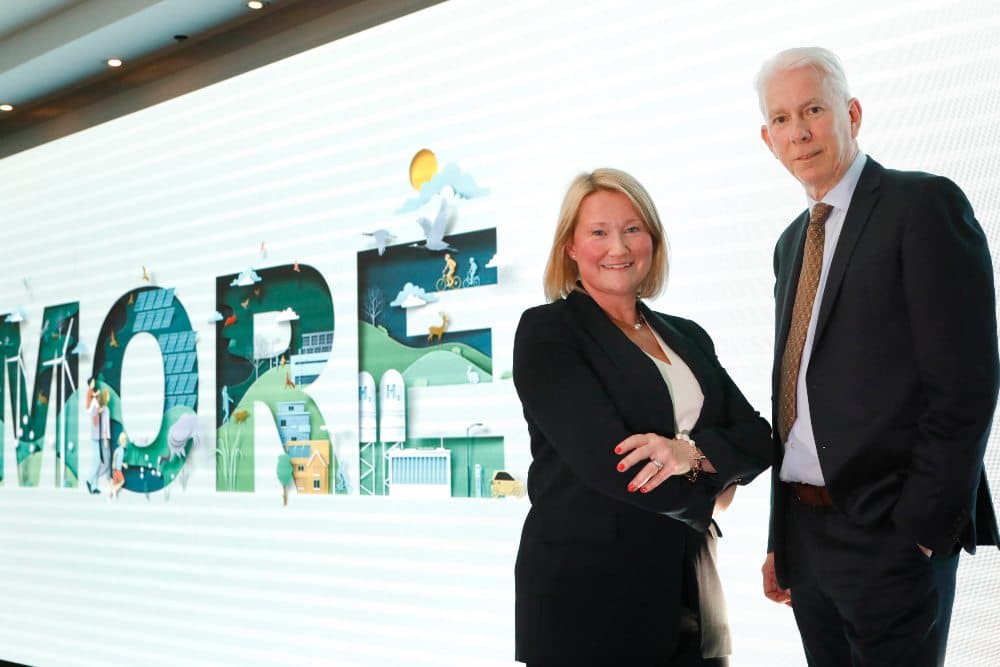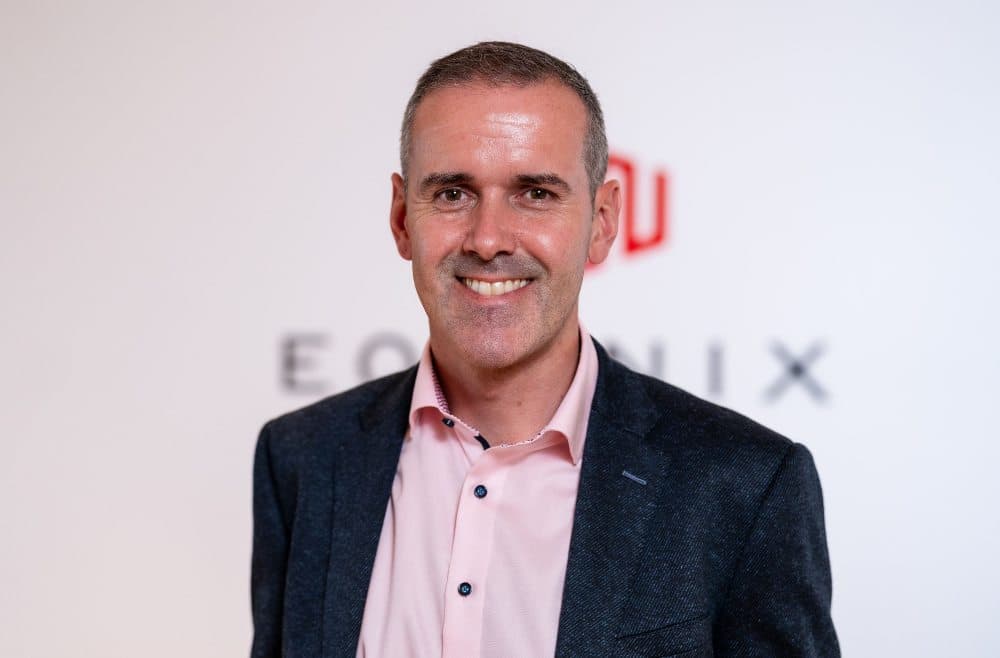Podcast Ep 204: Servecentric CEO Brian Roe believes that if it wasn’t for data centres, Covid could have been a greater catastrophe for the Irish economy.
A 30-year veteran of Irish tech, Servecentric’s CEO Brian Roe bought his first computer in 1981. Today he is at the helm of a privately-owned cloud, connectivity and data centre services provider headquartered in a tier 3 data centre facility in Dublin.
In many ways Roe’s career is an apt metaphor for Ireland’s digital journey, evolving from the days of microcomputers to personal computers and then cloud computing. At every step of these evolutions Ireland has prospered in terms of jobs and infrastructure. And now, at the dawn of the AI and quantum computing age, it has yet to be determined if we will continue to spearhead the next chapter of computing.
“I’m very bullish about the future of technology in Ireland”
An ongoing moratorium on data centres being built in Ireland due to concerns about how much energy these engine rooms of e-commerce consume is a growing cause of concern in terms of future investment. Data centre providers such as Equinix have had to put expansion plans on ice, leadership at giants like Amazon and entrepreneurs such as Niall Molloy of Echelon Data Centres warn that Ireland could be risking future investments and job creation opportunities.
Ireland is a global location of choice for digital talent and infrastructure
Listen to the Podcast on:
For Roe, there is no question that Ireland’s economy continued to generate revenues and taxes for the country when the world went into shutdown during the Covid pandemic. As businesses closed and workers were sent home, everything from software, e-commerce, cloud and remote working went through the data centres that operated 24×7.
“I always had an interest in tech growing up. I studied computer science at college and my first role was with a small PC reseller in the Far East. I returned in 1995 and worked at an Apple reseller called Typtec.”
An avid coder when he was young, he cut his teeth at entrepreneurship by starting his own web design business before returning to Typetec. “I discovered in that time that I was actually good at sales. I worked at Typetec for another eight years and by the time I had finished I was responsible for the entire P&L of the managed services division of that company.”
This led him on a foray into cloud computing and he joined Servecentric in 2016 as commercial director, taking over as CEO three years ago.
Roe’s journey through tech saw him guide businesses through the impacts of everything from Y2K, the dot-com crash, the onset of the smartphone revolution and the advent of cloud.
Ireland’s place as the digital capital of Europe, he believes, rests on our position as a location of choice for technology talent and data centres.
“If it wasn’t for data centres, Covid would have been a much greater catastrophe than it was. There were industries like hospitality and travel that were hugely impacted and badly hurt by the pandemic. But without the data centres, the masses of workers who were able to work from home and successfully run and grow businesses during that time wouldn’t have happened. I think that if the pandemic had happened 10 or 15 years early, before we had these digital capabilities, the outcomes could have been a lot worse.”
There are many facets to the data centre industry, Roe explains. There are the large hyperscale data centres that are run by household names in tech and telecoms such as AWS, and then there are service providers like Servecentric that effectively become the IT departments for a plethora of businesses that require always-on, highly secure computing. In March, Servecentric agreed at €10m deal with global data centre giant Digital Realty to extend a lease deal that will allow the Irish business to deliver reliable IT services in international markets including Europe, the US and India.
“We provide capabilities to companies that is different to them doing it themselves in very clean, contained, secure environments that are highly connected with low latency and connect them to places they want to get to like the US and Europe. We have 24/7 on-site security and technical resources to support them.”
Roe says the market in Ireland is quite complex and competitive. On one hand he is competing with the hyperscale cloud providers while on another he is connecting their services to Servecentric’s own clients. “Many businesses have cloud-only strategies while others want to take some of that back in-house themselves.”
As the world migrates to the next phase of technology defined by generative artificial intelligence (GenAI) and even quantum computing, Rose says the importance of security is paramount.
“Digital transformation has been happening since the 1980s, so it’s not a new thing. AI is not a new thing either – it’s been around for a while. ChatGPT just brought everybody’s attention to it. Businesses have to be at the cutting-edge of technology because their competitors are. But that doesn’t necessarily mean you have to jump onto the next fad that comes along. You have to focus on what’s best for your organisation. The more you become reliant on technology, the more security becomes a concern.”
He warns that the hackers are already using AI to target victims. “AI is becoming a function of bad actors and it is being used to counter that threat too. So it’s almost becoming a robo war in terms of cybersecurity rather than humans having an influence.”
He believes there is no doubt the AI age will impact jobs as we know them; the key is how people navigate change. “I’m old enough to have seen various revolutions and before my time there were other revolutions where people were going to be replaced. But I think people evolve to higher value roles and it will create employment as well.”
He adds: “There are a lot of things happening in tech besides AI, such as internet of things. I also think we will work less time as time goes on. We’ve gone from six to five and in many cases four-day working weeks and I do think that’s going to continue. We will work a shorter space of time, just a little smarter using AI and internet of things to continue with the lifestyles that we have.”
Whatever happens in terms of the impasse over the construction of future data centres, Roe believes the data centre sector is poised for massive growth and Ireland’s place could be assured. “As a result of companies like Google, Microsoft, Apple, Facebook, LinkedIn and others setting up in Ireland, we’ve created a hub of expertise. We’ve attracted people globally to work here. And a result we have a centralised nervous system. And what comes out of that is a lot of start-up activity. We have something like 2,000 start-ups in the tech industry in Ireland and a lot of them are in rapid growth.
“I’m very bullish about the future of technology in Ireland. If I was talking to a teenager considering a career in technology, I’d be saying you’ll be safe.”
There is no avoiding the concerns, however, about energy and how much the data centres consume. Roe believes Ireland has fallen behind when it comes to making use of ocean wind energy, with currently just the same handful of ocean wind turbines that were built in the 1990s active today. This contrasts severely with the UK where multiple offshore wind farms are generating gigawatts of energy. “While there are activities under way to change this, I would say from an energy point of view it is a supply issue rather than an demand issue.”
He is optimistic that in the next decade Ireland will become a predominantly renewable energy-based country with enough left over to sell abroad.
“The reality is we have to get to a net carbon neutral place as a country. And to do that we have to use renewable energy, be it wind or solar. And one of the things we have plenty of is wind, especially off the western seaboard. So we should be using that.”





